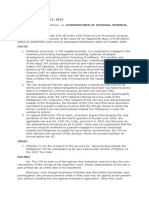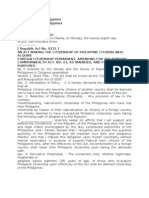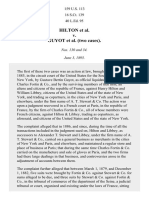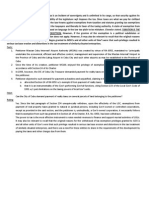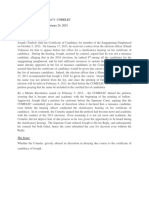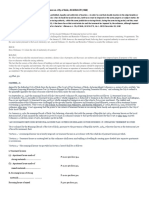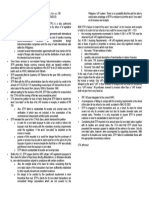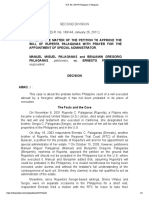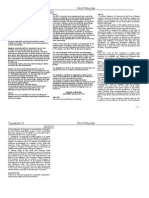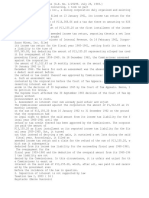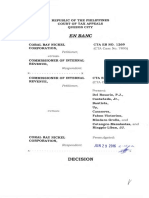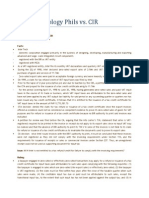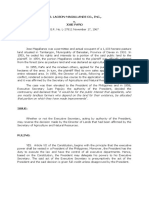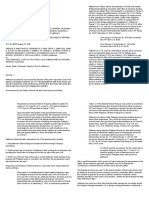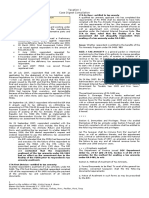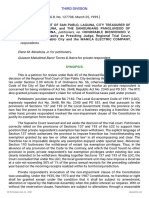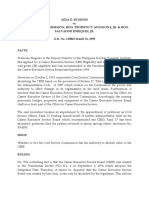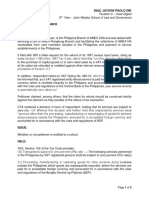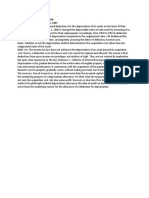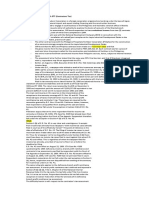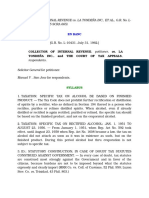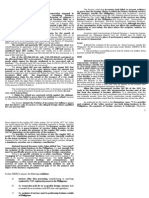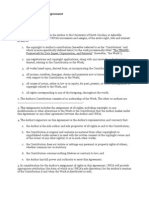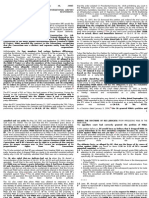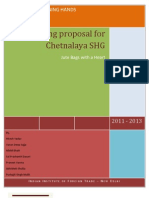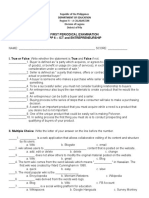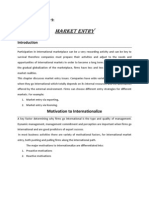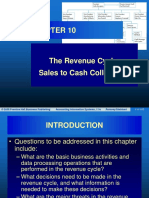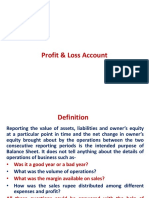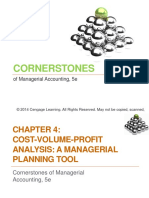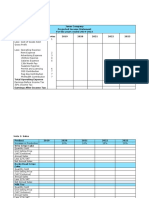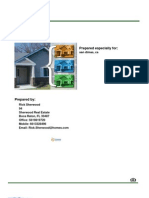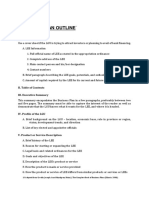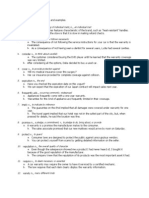Accenture Vs Cir
Accenture Vs Cir
Uploaded by
Cess EspinoCopyright:
Available Formats
Accenture Vs Cir
Accenture Vs Cir
Uploaded by
Cess EspinoOriginal Title
Copyright
Available Formats
Share this document
Did you find this document useful?
Is this content inappropriate?
Copyright:
Available Formats
Accenture Vs Cir
Accenture Vs Cir
Uploaded by
Cess EspinoCopyright:
Available Formats
Accenture vs CIR Facts: Accenture, Inc.
( Accenture) is a corporation engaged in the Business of providing management consulting, business strategies development, and selling and/or licensing of software. It is duly registered with the Bureau of Internal Revenue (BIR) as a Value Added Tax (VAT) taxpayer or enterprise in accordance with Section 236 of the National Internal Revenue Code (Tax Code). On 9 August 2002, Accenture filed its Monthly VAT Return for the period 1 July 2002 to 31 August 2002 (1st period). Its Quarterly VAT Return for the fourth quarter of 2002, which covers the 1st period, was filed on 17 September 2002; and an Amended Quarterly VAT Return, on 21 June 2004. Accenture filed its Monthly VAT Return for the month of September 2002 on 24 October 2002; and that for October 2002, on 12 November 2002. These returns were amended on 9 January 2003. Accentures Quarterly VAT Return for the first quarter of 2003, which included the period 1 September 2002 to 30 November 2002 (2nd period), was filed on 17 December 2002; and the Amended Quarterly VAT Return, on 18 June 2004. The monthly and quarterly VAT returns of Accenture show that, notwithstanding its application of the input VAT credits earned from its zerorated transactions against its output VAT liabilities, it still had excess or unutilized input VAT credits. These VAT credits are in the amounts of 9,355,809.80 for the 1stperiod and 27,682,459.38 for the 2nd period, or a total of 37,038,269.18. Out of the 37,038,269.18, only 35,178,844.21 pertained to the allocated input VAT on Accentures domestic purchases of taxable goods which cannot be directly attributed to its zero-rated sale of services. This allocated input VAT was broken down to 8,811,301.66 for the 1stperiod and 26,367,542.55 for the 2nd period. The excess input VAT was not applied to any output VAT that Accenture was liable for in the same quarter when the amount was earnedor to any of the succeeding quarters. Instead, it was carried forward to petitioners 2nd Quarterly VAT Return for 2003. Thus, on 1 July 2004, Accenture filed with the Department of Finance (DoF) an administrative claim for the refund or the issuance of a Tax Credit Certificate (TCC). The DoF did not act on the claim of Accenture. Hence, on 31 August 2004, the latter filed a Petition for Review with the First Division of the Court of Tax Appeals (Division), praying for the issuance of a TCC in its favor in the amount of 35,178,844.21. The Commissioner of Internal Revenue (CIR), in its Answer argued that: 1. The sale by Accenture of goods and services to its clients are not zero-rated transactions. 2. Claims for refund are construed strictly against the claimant, and Accenture has failed to prove that it is entitled to a refund, because its claim has not been fully substantiated or documented. The Division denied the Petition of Accenture for failing to prove that the latters sale of services to the alleged foreign clients qualified for zero percent VAT.
The Division ruled that Accenture had failed to present evidence to prove that the foreign clients to which the former rendered services did business outside the Philippines. Ruling that Accentures services would qualify for zero-rating under the 1997 National Internal Revenue Code of the Philippines (Tax Code) only if the recipient of the services was doing business outside of the Philippines,the Division cited Commissioner of Internal Revenue v. Burmeister and Wain Scandinavian Contractor Mindanao, Inc. (Burmeister) as basis. The Supreme Court found that, although the place of the consumption of the service does not affect the entitlement of a transaction to zero-rating, the place where the recipient conducts its business does. Accenture cited Commissioner of Internal Revenue v. American Express International, Inc. (Philippine Branch) (G.R. No. 152609, June 29, 2005), the Supreme Court held that the place of performance and/or consumption of the service is immaterial.
Held: Even though a Petition was filed before a Supreme Court pronouncement in a separate case (i.e., new doctrine in Burmeister) was promulgated, the pronouncement made in that case may be applied to the pending petition without violating the rule against retroactive When the Supreme Court decides a case, it does not pass a new law, but merely interprets a preexisting one. Such interpretation became part of the law from the moment it became effective. The Supreme Court's construction merely establishes the contemporaneous legislative intent that the interpreted law carried into effect.
You might also like
- Accenture, Inc. v. CIR, G.R. No. 190102, July 11, 2012Document2 pagesAccenture, Inc. v. CIR, G.R. No. 190102, July 11, 2012Kelly RoxasNo ratings yet
- Republic VH IzonDocument4 pagesRepublic VH IzonanailabucaNo ratings yet
- Balmaceda Vs CorominasDocument9 pagesBalmaceda Vs Corominaskoey100% (1)
- Commissioner of Internal Revenue vs. Court of Tax Appeals, G.R. No. 106611 (July 21, 1994)Document6 pagesCommissioner of Internal Revenue vs. Court of Tax Appeals, G.R. No. 106611 (July 21, 1994)Lou AquinoNo ratings yet
- Abello Case DigestDocument8 pagesAbello Case DigestNika RojasNo ratings yet
- 32.protector's Services, Inc. vs. CA (12 April 2000)Document3 pages32.protector's Services, Inc. vs. CA (12 April 2000)RICKY ALEGARBESNo ratings yet
- ABS-CBN Broadcasting Corp. v. CTA, 108 SCRA 143Document1 pageABS-CBN Broadcasting Corp. v. CTA, 108 SCRA 143Rhenee Rose Reas SugboNo ratings yet
- Republic of The Philippines Congress of The Philippines Metro Manila Twelfth Congress Third Regular SessionDocument3 pagesRepublic of The Philippines Congress of The Philippines Metro Manila Twelfth Congress Third Regular SessionChristina Ty Naya SatiraNo ratings yet
- Hilton v. Guyot, 159 U.S. 113 (1895)Document64 pagesHilton v. Guyot, 159 U.S. 113 (1895)Scribd Government Docs100% (1)
- 10 Uy Siuliong Vs DirectorDocument2 pages10 Uy Siuliong Vs DirectorImariNo ratings yet
- Case DigestDocument10 pagesCase DigestEqui TinNo ratings yet
- Commissioner of Internal Revenue Vs Central Luzon Drug Corporation GR No 159647Document36 pagesCommissioner of Internal Revenue Vs Central Luzon Drug Corporation GR No 159647Tamara Bianca Chingcuangco Ernacio-TabiosNo ratings yet
- Eusibio Villanueva EtDocument2 pagesEusibio Villanueva EtJenalin FloranoNo ratings yet
- The Facts:: Case Name: Joseph B. Timbol V. COMELEC G.R. No. 206004 February 24, 2015Document2 pagesThe Facts:: Case Name: Joseph B. Timbol V. COMELEC G.R. No. 206004 February 24, 2015Ten LaplanaNo ratings yet
- 15 ABS CBN vs. CTA 108 SCRA 142Document6 pages15 ABS CBN vs. CTA 108 SCRA 142Rogelio CartinNo ratings yet
- Villanueva vs. City of Iloilo, 26 SCRA 578 (1968) : Castro, J.Document5 pagesVillanueva vs. City of Iloilo, 26 SCRA 578 (1968) : Castro, J.billy joe andresNo ratings yet
- BagatsingDocument1 pageBagatsingRuby SantillanaNo ratings yet
- CIR vs. Campos RuedaDocument1 pageCIR vs. Campos RuedaSamm LaurenNo ratings yet
- Eastern Telecommunications Philippines v. CIRDocument1 pageEastern Telecommunications Philippines v. CIRMarcella Maria KaraanNo ratings yet
- Sarmiento vs. ECC GR No. 65680, May 11, 1988Document3 pagesSarmiento vs. ECC GR No. 65680, May 11, 1988Winnie Ann Daquil LomosadNo ratings yet
- Quiz I General Principles of TaxationDocument3 pagesQuiz I General Principles of Taxationkristian datinguinooNo ratings yet
- FLEISCHER V BOTICA NOLASCODocument1 pageFLEISCHER V BOTICA NOLASCOAylwin John PerezNo ratings yet
- Board of Assessment Appeals of Laguna v. CTA, 8 SCRA 224Document3 pagesBoard of Assessment Appeals of Laguna v. CTA, 8 SCRA 224Karen RonquilloNo ratings yet
- Polo V CIR DigestDocument1 pagePolo V CIR DigestKTNo ratings yet
- First Division 2024Document31 pagesFirst Division 2024mrmartinezNo ratings yet
- 42 G.R. No. 169144 - Palaganas v. PalaganasDocument4 pages42 G.R. No. 169144 - Palaganas v. PalaganasCamille CruzNo ratings yet
- Remedies Under TCC Compiled DigestsDocument6 pagesRemedies Under TCC Compiled Digestscmv mendozaNo ratings yet
- Cir V Itogon-Suyoc MinESDocument2 pagesCir V Itogon-Suyoc MinESkeloNo ratings yet
- Gonzalo Sy V Central BankDocument16 pagesGonzalo Sy V Central BankSocNo ratings yet
- Coral Bay Nickel Corp Vs CIRDocument14 pagesCoral Bay Nickel Corp Vs CIRMiley LangNo ratings yet
- e-SCRA COM IR vs. Solid BankDocument42 pagese-SCRA COM IR vs. Solid Bankflordelei hocateNo ratings yet
- Cir Vs Marubeni Corporation, G.R. No. 137377 FactsDocument2 pagesCir Vs Marubeni Corporation, G.R. No. 137377 FactsAaliyah AndreaNo ratings yet
- CIR vs. M. LhuillierDocument2 pagesCIR vs. M. LhuillierTin NavarroNo ratings yet
- Labrador vs. Court of Appeals, April 5, 1990Document2 pagesLabrador vs. Court of Appeals, April 5, 1990Karen Sheila B. Mangusan - Degay100% (1)
- Intel Technology Phils. Inc. vs. CIR GR No. 166732 - April 27, 2007 FactsDocument5 pagesIntel Technology Phils. Inc. vs. CIR GR No. 166732 - April 27, 2007 FactsCHow GatchallanNo ratings yet
- Figuerres vs. Court of AppealsDocument13 pagesFiguerres vs. Court of AppealsPaul PsyNo ratings yet
- 7.1 Gokongwei v. SECDocument2 pages7.1 Gokongwei v. SECI took her to my penthouse and i freaked it100% (1)
- Corpo Lecture: Board of Directors/trustees/officers: Quarantine Notes 1Document34 pagesCorpo Lecture: Board of Directors/trustees/officers: Quarantine Notes 1Raphael Fernand MartinezNo ratings yet
- Case DigestsDocument3 pagesCase DigestsAnna Dela VegaNo ratings yet
- CIR Vs GOTAMCO, GR NO L-31092, FEB 27, 1987Document6 pagesCIR Vs GOTAMCO, GR NO L-31092, FEB 27, 1987KidMonkey2299No ratings yet
- Estate Tax: Composition of Gross EstateDocument45 pagesEstate Tax: Composition of Gross EstateRalf Arthur SilverioNo ratings yet
- BDO vs. Republic, G.R. No. 198756, January 13, 2015Document26 pagesBDO vs. Republic, G.R. No. 198756, January 13, 2015Your Public ProfileNo ratings yet
- Conwi v. Cir, 213 Scra 83Document4 pagesConwi v. Cir, 213 Scra 83Anonymous iOYkz0wNo ratings yet
- Taxation I Case Digest Compilation: CIR vs. Philippine Aluminum (Second Division)Document2 pagesTaxation I Case Digest Compilation: CIR vs. Philippine Aluminum (Second Division)Gyrsyl Jaisa GuerreroNo ratings yet
- City Government of San Pablo, Laguna v. Reyes 305 SCRA 353Document11 pagesCity Government of San Pablo, Laguna v. Reyes 305 SCRA 353Jessica Melle GaliasNo ratings yet
- Aida D. Eugenio vs. Civil Service Commission, Hon. Teofisto T. Guingona, Jr. & Hon. Salvador Enriquez, Jr. G.R. No. 115863 March 31, 1995Document2 pagesAida D. Eugenio vs. Civil Service Commission, Hon. Teofisto T. Guingona, Jr. & Hon. Salvador Enriquez, Jr. G.R. No. 115863 March 31, 1995Russ TuazonNo ratings yet
- Power Homes vs. SecDocument2 pagesPower Homes vs. SecRio TolentinoNo ratings yet
- (Digest) Taganito v. CIRDocument1 page(Digest) Taganito v. CIRHomer SimpsonNo ratings yet
- CIR v. American Express PHIL. BranchDocument2 pagesCIR v. American Express PHIL. BranchJaypoll DiazNo ratings yet
- Basilan Estates vs. CirDocument1 pageBasilan Estates vs. CirLizzy WayNo ratings yet
- CIR Vs Court of Tax Appeals and Petron CorpDocument8 pagesCIR Vs Court of Tax Appeals and Petron CorpAnthony Tamayosa Del AyreNo ratings yet
- Bar Ops - 4Document20 pagesBar Ops - 4YsabelleNo ratings yet
- CIR V. MARUBENI 372 SCRA 577 (Contractors Tax)Document2 pagesCIR V. MARUBENI 372 SCRA 577 (Contractors Tax)Emil BautistaNo ratings yet
- 3 - Power Sector Assets vs. CIRDocument76 pages3 - Power Sector Assets vs. CIRJeanne CalalinNo ratings yet
- Intermountain Lumber Co. v. CommissionerDocument7 pagesIntermountain Lumber Co. v. Commissionerandrea ibanezNo ratings yet
- CIR vs. Magsaysay LinesDocument1 pageCIR vs. Magsaysay Lineskaira marie carlosNo ratings yet
- Collector of Internal Revenue vs. La Tonde A Inc. (1962, 5 SCRA 665)Document7 pagesCollector of Internal Revenue vs. La Tonde A Inc. (1962, 5 SCRA 665)KTNo ratings yet
- PAGCOR Vs CIRDocument2 pagesPAGCOR Vs CIRMystic YuèliàngerNo ratings yet
- CIR v. FIlmineraDocument3 pagesCIR v. FIlmineraMatt SepeNo ratings yet
- Accenture Vs CirDocument2 pagesAccenture Vs CirCess EspinoNo ratings yet
- Accenture Vs CirDocument2 pagesAccenture Vs CirCess EspinoNo ratings yet
- Fac Copyright AssignmentDocument2 pagesFac Copyright AssignmentCess EspinoNo ratings yet
- Outline in Remedial Law 1hgDocument54 pagesOutline in Remedial Law 1hgnchlrysNo ratings yet
- Serrano Vs GallantDocument13 pagesSerrano Vs GallantCess EspinoNo ratings yet
- (G.R. No. 164517, June 30, 2008) BF Corporation, Petitioner, vs. Manila International Airport Authority, Respondent. DecisionDocument4 pages(G.R. No. 164517, June 30, 2008) BF Corporation, Petitioner, vs. Manila International Airport Authority, Respondent. DecisionCess EspinoNo ratings yet
- Nollaig Highland Resort1Document23 pagesNollaig Highland Resort1rebecca dicksonNo ratings yet
- Book1bba3day SupervisorsDocument16 pagesBook1bba3day SupervisorsIsrael OtekaNo ratings yet
- Ronald Hilton Chapter 3Document25 pagesRonald Hilton Chapter 3Swati67% (3)
- NGO Report To Joining HandsDocument18 pagesNGO Report To Joining HandsPraneet VarmaNo ratings yet
- First Periodical Examination Epp 6 - Ict and EntrepreneurshipDocument6 pagesFirst Periodical Examination Epp 6 - Ict and EntrepreneurshipXemnas DelacroixNo ratings yet
- Art Jewelry 2015-03Document84 pagesArt Jewelry 2015-03graciela100% (9)
- 6Document10 pages6ampfcNo ratings yet
- Market EntryDocument8 pagesMarket Entrywajiha1985No ratings yet
- Arsenal Annual Report 2008Document56 pagesArsenal Annual Report 2008changers22100% (25)
- Market Potential of Maruti Suzuki IndiaDocument81 pagesMarket Potential of Maruti Suzuki IndiaAru.SNo ratings yet
- Hapter 10: © 2008 Prentice Hall Business Publishing Accounting Information Systems, 11/e Romney/SteinbartDocument134 pagesHapter 10: © 2008 Prentice Hall Business Publishing Accounting Information Systems, 11/e Romney/SteinbartRoristua PandianganNo ratings yet
- CV Mirza Norman 2019Document4 pagesCV Mirza Norman 2019Mirza NormanNo ratings yet
- David OgilvyDocument5 pagesDavid OgilvyNiranjana ChandranNo ratings yet
- Profit & Loss AccountDocument12 pagesProfit & Loss AccountSubhadeeptaSahooNo ratings yet
- Cornerstones: of Managerial Accounting, 5eDocument34 pagesCornerstones: of Managerial Accounting, 5eWidya RahmawatiNo ratings yet
- Sales Training 2014Document116 pagesSales Training 2014Subrata Das0% (1)
- C. Financial Projection Jaran Company Projected Income Statement For The Years Ended 2019-2023 Notes 2019 2020 2021 2022 2023Document6 pagesC. Financial Projection Jaran Company Projected Income Statement For The Years Ended 2019-2023 Notes 2019 2020 2021 2022 2023Patrick629No ratings yet
- Nestle 2Document32 pagesNestle 2Faizan Ch0% (1)
- Commodity Derivatives 1Document29 pagesCommodity Derivatives 1Bibhudatta MishraNo ratings yet
- Prepared Especially For:: San Dimas, CaDocument14 pagesPrepared Especially For:: San Dimas, CaeNeighborhoodsNo ratings yet
- CFA - Industry AnalysisDocument29 pagesCFA - Industry AnalysisMarcNo ratings yet
- Week 8 Entrep (April 26-30)Document7 pagesWeek 8 Entrep (April 26-30)LouisseNo ratings yet
- Sales Order Management FlowDocument28 pagesSales Order Management Flowanon_36571823No ratings yet
- Microsoft Dynamics AX 2012 R3Document11 pagesMicrosoft Dynamics AX 2012 R3Sildi MetaNo ratings yet
- Business Plan Outline I. Cover Sheet: II. Table of Contents III. Executive SummaryDocument4 pagesBusiness Plan Outline I. Cover Sheet: II. Table of Contents III. Executive SummaryLina FarrofoNo ratings yet
- ICI Paints BusinessDocument43 pagesICI Paints Businessmuhammadtaimoorkhan100% (1)
- Working Capital Management in HCL InfosystemDocument30 pagesWorking Capital Management in HCL InfosystemCyril ChettiarNo ratings yet
- Product Life Cycle of LuxDocument36 pagesProduct Life Cycle of LuxVishal Gupta100% (1)
- WarrantiesDocument3 pagesWarrantiesNguyễn Minh NhấtNo ratings yet
- Evolution of The Music Industry Over The Last Twenty YearsDocument15 pagesEvolution of The Music Industry Over The Last Twenty YearsAlbany ArrageNo ratings yet
